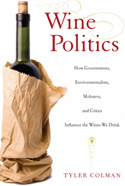By Jim Boyce
New York-based Tyler Colman writes the accessible, informative, and entertaining blog Dr. Vino, which nicely lives up to its tag line, “wine talk that goes down easy.” In addition to teaching wine classes and contributing to publications such as Food & Wine and Wine & Spirits, he recently authored his first book, Wine Politics: How Governments, Environmentalists, Mobsters, and Critics Influence the Wines We Drink. I asked him about blogs versus print media, wine’s carbon footprint, some good wines for newbies, his book, and more.
What difference is there between someone who blogs about wine as opposed to someone who writes about it for the traditional media?
Well, I suppose if the writer for traditional media were a staff writer, then they would get a salary and benefits!
 I write for both my blog and print publications, I’d say that the two media are good in different ways. On my blog, I can post about an event quickly and conceivably run lots of photos or an interview or whatever. In print, the stories tend to be longer and therefore take more time to develop. But a writer can bring a sense of investigative journalism to both media–I have certainly picked up the phone to explore an issue for a blog posting and that sort of thing can actually lead to great postings. And it’s much faster than traditional media. It’s just a pity that the financial reward isn’t always there for blogging, particularly about wine.
I write for both my blog and print publications, I’d say that the two media are good in different ways. On my blog, I can post about an event quickly and conceivably run lots of photos or an interview or whatever. In print, the stories tend to be longer and therefore take more time to develop. But a writer can bring a sense of investigative journalism to both media–I have certainly picked up the phone to explore an issue for a blog posting and that sort of thing can actually lead to great postings. And it’s much faster than traditional media. It’s just a pity that the financial reward isn’t always there for blogging, particularly about wine.
One thing I love about blogging is the reader interactions that print media have trouble providing. Join the fray!
You have taught wine classes at New York University and University of Chicago. What is your approach to teaching students about wine? How do their views of wine different from when you went to school?
Well, the classes I teach are for adult learners, not undergrads. (Can you imagine if a parent opened a report card to find a class about wine appreciation? You’d better hope you got an A!)
We always taste wines, generally about seven to ten around a certain theme. I always try to link wine to broader themes be it history, pop culture, economics, politics–something you don’t have to be a wine geek to understand since that broadens our discussion about wine. And I always try to make it engaging and fun!
Your research with Pablo Paster on the “carbon footprint” of making and transporting wine finds that, “Drinking a wine made without agrichemicals, from larger format bottles, or wine that has traveled fewer miles is the more ‘green’ option.” This suggests the carbon- friendly choice for China is domestic wine (now 70 percent of the market) or wine (especially in bulk) imported from Australia or the Pacific coast as opposed to from Europe. What’s your take on this?
Exactly correct–those would be the lowest carbon footprint options.
One of the key takeaways from our research was that distance matters so drinking locally is a good option. But drinking wine from far-away places can also have a lower carbon footprint if it is sent via ship instead of truck (or air, the worst). Packaging also matters and the lighter it is, the better. In this regard, I am continually disappointed by the quality of wine in bag-in-box format. The technology is great but I just wish the wine would improve.
Even though it is important to think about your carbon footprint in all activities, wine drinking still is but an hors d’oeuvre in our overall carbon diet. Since wine often is unique and contributes to a culture of wine growing somewhere in the world, it may also pay to try to cut your carbon emissions in other parts of your life and just drink what you like.
Where do you stand on the cork versus screw cap debate?
I don’t like TCA. If it can be eliminated, then my enthusiasm for cork rises.
Hypothetical: You get an email from someone who has never drunk wine but wants you to suggest the first five bottles he or she should try. Knowing nothing about the person, what wines would you recommend?
Moscato d’Asti (from a small producer such as Ellio Perrone): perhaps the ultimate newbie wine! A German Riesling, such as Donnhoff: so many beautiful choices. A Loire Cabernet Franc from a natural producer such as Clos Roche Blanche: so much fun, so food friendly. A mature Bordeaux–see if they like the age thing. A 2005 red Burgundy to see if they like Pinot Noir, old-world style.
What should readers expect from your book, Wine Politics?
 In it, I tell the story of wine in France and the United States through the lens of industry politics. Among other things, I discuss the struggle of how lines get drawn for growing areas, why small producers in America can be disadvantaged by the distribution system, and how critics serve as powerful gatekeepers.
In it, I tell the story of wine in France and the United States through the lens of industry politics. Among other things, I discuss the struggle of how lines get drawn for growing areas, why small producers in America can be disadvantaged by the distribution system, and how critics serve as powerful gatekeepers.
Check it out!
What does Dr. Vino drink on a hot summer day? While blogging? To celebrate his first book?
On a hot summer day, I always like a dry rose from France. But I recently had some dry rieslings from Australia that were great, too! And for celebrations, Champagne is always a good way to go–Louis Roederer makes a very good non-vintage as does Pierre Peters, both about $30.
Cheers!
Sign up for the Grape Wall newsletter here. Follow Grape Wall on LinkedIn, Instagram, Facebook and Twitter. And see my sibling sites World Marselan Day, World Baijiu Day and Beijing Boyce. Grape Wall has no advertisers, so if you find the content useful, please help cover the costs via PayPal, WeChat or Alipay. Contact Grape Wall via grapewallofchina (at) gmail.com.
Leave a Reply
You must be logged in to post a comment.